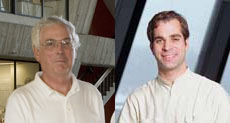Tully, Green new leaders of LHC Physics Center

Dan Green, left, and Chris Tully
With the construction of the CMS detector well underway and the CMS collaboration preparing to take physics data in 2008, Director Pier Oddone appointed Chris Tully, Princeton University, and Dan Green, Fermilab, as the coordinators of the LHC Physics Center at Fermilab. The LPC, located on the 10th and 11th floors of Wilson Hall, provides support for CMS collaborators working in the U.S.
Tully, who got involved in CMS in 1994, has been a member of the DZero collaboration at Fermilab since 2002. Green has worked on CMS since 1994 and initiated the U.S. involvement in the CMS experiment. NSF and DOE have contributed $167 million toward the construction of the CMS detector.
"Dan and I have worked together on the CMS Hadron Calorimeter for about six years," said Tully. "I think we are a great team. There is a lot of momentum we can generate."
While the LPC is key element of the CMS Physics analysis plan at Fermilab, it is also part of the U.S. CMS organization and a key element of the CMS governance report. "The universities own the LPC as much as Fermilab," said Lothar Bauerdick, head of the CMS Center. "Surveys have shown that the majority of U.S. CMS users will use the LPC. Now is the time to firmly establish the LPC and prepare the place for CMS data taking and real physics analyses."
CMS physicist Dan Marlow, Princeton University, chaired the committee that consulted about 50 U.S. CMS institutions before presenting to Odoone a short list of candidates to lead the LPC. "The LPC should be a place where CMS physicists can pursue their physics goals," said Marlow. "People will come to the LPC saying, 'Here is what I want to do," and the LPC will help them. Chris and Dan are both excellent physicists who can make this happen."
Tully and Green are following in the footsteps of Sarah Eno, University of Maryland, and Avi Yagil, now at UC San Diego, who led the LPC efforts so far. "They have made this place what it is now," said Bauerdick. "It's a busy place."
Green, who invented the LPC concept, pointed out the importance of operating the LPC as part of the worldwide CMS collaboration. "We need buy-in from the entire collaboration and need to maximize our resources," he said. "We want to be joined at the hip with the CMS Physics Coordination. This is not a Fermilab show."
-- Kurt Riesselmann
|